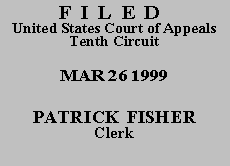

| KELLY LAMONT MAJOR,
Petitioner-Appellant, v. KEN KLINGER, Respondent-Appellee. |
|
Kelly Lamont Major, a prisoner of the State of Oklahoma appearing pro se, appeals from the denial of his petition for habeas corpus relief filed under 28 U.S.C. § 2254. He also seeks leave to proceed in forma pauperis on appeal.
Petitioner was convicted of Possession of Cocaine after Conviction of a Felony and Trafficking in Illegal Drugs after Conviction of a Felony and was sentenced to two consecutive terms of life imprisonment. His conviction and sentences were affirmed on direct appeal, and his application for post-conviction relief filed in the state court was denied initially and on appeal. The magistrate judge throughly and carefully reviewed his petition for federal habeas corpus relief, recommending that relief be denied. The district court independently and carefully reviewed petitioner's objections to the magistrate judge's findings and recommendation. It adopted the recommendation, denying petitioner habeas relief, a certificate of appealability, and leave to proceed in forma pauperis.
Because petitioner filed his § 2254 motion after the effective date of the Antiterrorism and Effective Death Penalty Act (AEDPA), he must obtain a certificate of appealability before he may appeal the district court's denial of federal habeas relief. See 28 U.S.C. § 2253(c)(1)(A). To obtain a certificate of appealability, petitioner must make "a substantial showing of the denial of a constitutional right." Id. § 2253(c)(2). On appeal, petitioner repeats his arguments that trial and appellate counsel provided ineffective assistance at the preliminary hearing, at trial, and on direct appeal, and that the search that led to the discovery of more than 250 rocks of cocaine was invalid. We have carefully reviewed his briefs on appeal, the magistrate judge's findings and recommendation, the district court memorandum opinion and order, and the record on appeal. We determine that petitioner's arguments are frivolous and without merit. We deny him a certificate of appealability, and dismiss the appeal.
We also deny his request for leave to proceed in forma pauperis on appeal. Petitioner must demonstrate "a financial inability to pay the required [filing] fees and the existence of a reasoned, nonfrivolous argument on the law and facts in support of the issues raised on appeal." McIntosh v. United States Parole Comm'n, 115 F.3d 809, 812-13 (10th Cir. 1997) (quotation omitted). Petitioner has failed to meet this standard.
Petitioner's application to proceed in forma pauperis is denied. His motion to file two supplements to his opening brief is granted. His motion to strike a portion of the supplements to his opening brief is granted. His application for a certificate of appealability is denied, and the appeal is DISMISSED. The mandate shall issue forthwith.
Entered for the Court
Circuit Judge
*. This order and judgment is not binding precedent, except under the doctrines of law of the case, res judicata, and collateral estoppel. The court generally disfavors the citation of orders and judgments; nevertheless, an order and judgment may be cited under the terms and conditions of 10th Cir. R. 36.3.